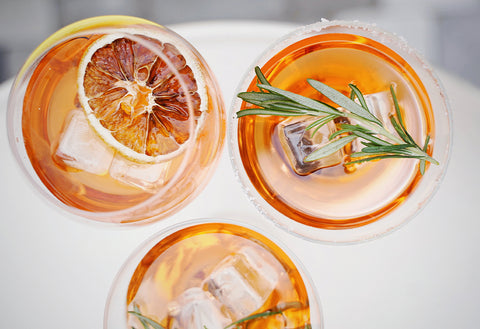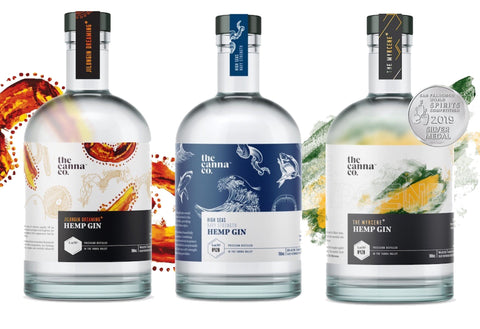Myrcene Hemp Gin: The Truth Behind Its Winning Ingredient

If you didn't know - Terpenes are the essential oils of plants that produce a strong aroma. They give fruits and herbs their distinct smell and taste. Terpenes serve as natural defences for plants against predators, UV rays, and other environmental stressors. Because of their healing properties, these volatile oil molecules can also be found in many common aromatherapy and beauty products. There are over 200 different terpenes found in nature. Still, only a few are worthy of being used, and it took years to perfect the flavour of our alcoholic drink range. One such terpene is Myrcene, which is a primary source of the aroma in hops, cannabis, and fruit like bananas or unripe mangoes. It's one of the most abundant terpenes found in hemp as well. With all these connections between hemp and Myrcene, it's no wonder that we used it as the base in our award-winning gin. So what exactly is Myrcene? Let's take a look!
What Is Myrcene Exactly?
The word "myrcene" is derived from the word "myrrh," which is an ancient spice with a similarly pungent aroma. Myrcene is an essential oil found in herbs like bay, cilantro, and wild parsnip. Myrcene is responsible for the strong smell of hops and has a significant impact on the beer's flavour. In fact, most beer recipes include a specific quantity of hops based on their myrcene content. This ingredient is what gives beer its bitter flavour, its flavour profile, and its aroma. Cannabis tends to have a slightly different scent depending on whether it contains high or low levels of Myrcene, but the differences are often quite subtle.
Myrcene Is The Most Abundant Terpene Found In Cannabis
Terpenes work with other cannabinoids, such as CBD and THC, creating a union of compounds that achieve better results as a group than they would in isolation – an outcome known as "The Entourage Effect". Terpenes are an increasingly sought-after commodity used in high concentrations such as this due to their therapeutic value in dietary health and wellness supplements. When cannabis is utilised for its health-giving properties, it works best as a whole plant therapy featuring more than just isolated cannabinoids. This is why we've carefully crafted this gin using a secret recipe and selected elements from the hurd, bast and seed of the cannabis plant to produce the hemp formula used in our distillation.
Myrcene is known to compose up to 50% of the total terpene content found in individual strains of cannabis, with Myrcene strains reputed to produce upbeat and euphoric effects alongside an overall feeling of relaxation. Myrcene is perhaps the most highly-valued terpene due to its ability to ease chronic pain and inflammation symptoms.
Read more about the clinical uses and science behind the Myrcene Terpene here.

Why Mix Gin With Cannabis?
Our decision to select gin as the perfect spirit to distil using cannabis was strongly influenced by an early 17th-century gin-making practice. Back in the day, there was an explosion in the spirit's popularity due to new liberal laws around unlicensed gin production in Britain.
Small distillers began producing gin in residential houses, flavouring their creations with terpenes obtained from the forest by distilling the resin – primarily from pines. We may be the first gin makers in history to utilise cannabis terpenes in the distillation process. However, we still like to imagine old-time English dames chucking a few dank buds into the tank when they whipped up a fresh batch of "Mother's Ruin"! Whereas these early pioneers used primitive pot stills and added terpenes to mask crudely-produced spirits, we use column stills to craft a lighter, more refined gin, adding Myrcene for its joyful sense of euphoria alongside its relaxation-inducing qualities.
While the Dutch are infamous for their progressive view towards marijuana, they're less widely known as creators of one of the world's most popular spirits. Whereas humans had already been using cannabis recreationally and medically for over 12,000 years, the history of gin dates back to the 13th century, when Northern European distillers began adding herbs to malt wine. Juniper became a central element of this new drink, with the juniper berry prized for its medicinal effects. The English word for gin was adopted from a shortening of the spirit's original name: jenever, from the Latin Juniperus. Indeed, "Dutch courage" (a popular term for alcohol-induced bravery) was reportedly coined by English soldiers during the 80 Years War of 1568–1648 when they would drink jenever (gin) to calm their nerves before battle*.
*The Cannabis Company does not recommend drinking this gin before the battle

With gin & cannabis both known for having solid olfactory identities, a further commonality between both is their medicinal use. Interestingly, just like cannabis, Juniper berries are valued for their anti-inflammatory properties, ideal for relieving pain due to rheumatism and arthritis. The Greeks used the berries in many of their Olympic events because they believed that the berries increased physical stamina in athletes. At the same time, juniper berries were also used in traditional medicine for female birth control*. By the mid-17th century, Dutch and Flemish pharmacies sold gin made with juniper, anise and coriander – all of which are used in the distillation of The Myrcene Hemp Gin. These old-school pharmaceutical gins were used to treat medical problems such as lumbago, kidney stones and gout – just like cannabis in Ancient China.
*In our experience, imbibing this gin leads to an increased likelihood of participation in activities requiring the use of birth control methods.
Myrcene & Its Unique Benefits.
Myrcene is known as an anti-bacterial, anti-diabetic, anti-inflammatory, anti-proliferative, antipsychotic, and anti-spasmodic. Cannabinoids have been demonstrated to absorb more efficiently into the blood-brain barrier when terpenes are present, allowing them to bind to receptors in the endocannabinoid system. This is usually experienced as an analgesic response. In other words, Myrcene is a painkiller that destroys harmful bacteria, lowers glucose levels in your blood and reduces swelling; an excellent outcome for those who suffer from auto-immune conditions. Although further research is needed, Myrcene may reduce the spread of cancer cells, especially when paired with CBD, which naturally suppresses the proliferation of excessive cells and helps reduce the size of tumours. Myrcene is likewise reputed to contribute to improved mental health and help with IBS.
Myrcene & Juniper: A Match Made In Melbourne
While the history of gin spans the globe, a final fascinating piece of the puzzle brings it all back home. Australia's dark colonial past meant that quinine (the primary constituent of tonic water) was an essential medicine in former times. With 10% of hospital admissions in Darwin being due to malaria by 1899, quinine was widely employed as the only effective anti-malarial compound available. A common practice in tropical British colonies was to soften quinine's bitter flavour by adding gin. Australia today has thankfully outgrown many of its more negative colonial echoes. However, it still retains one old habit which has now gone global: taking the edge off the mozzies with a cool gin & tonic.
In conclusion - Myrcene is key to a number of biological functions in the body, including regulating inflammation and the immune system, promoting cardiovascular health and maintaining the body's healthy balance of hormones. The quality of the input cannabis must be high-grade and free of any contaminates. In contrast, the quality of the base liquor must be excellent and high-quality also. It's, therefore, vital that you choose the proper cannabis gin for your occasion.
Fancy a Myrcene Negroni, click here to get the recipe!
Checkout The Others In Our Gin Range






